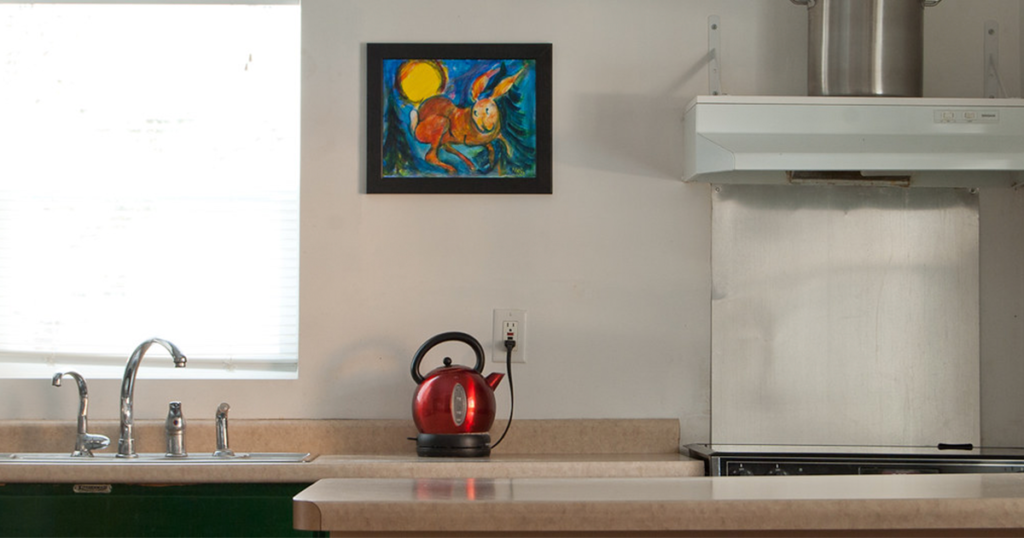
In October, I repainted my kitchen over the long weekend for Día de la Hispanidad, as the holiday on the 12th is named here. In the States, the holiday is Columbus Day, or as some states officially call it, Indigenous Peoples’ Day. These name changes—I’m not sure what to think. I’m used to what I’m used to, though I don’t object to the changes from before my time, especially when those changes map the history of a place, as with Fort Caroline, in Florida, which became San Mateo, which became Cow Ford, which became Jacksonville. But why hasn’t someone objected to a onetime Timucua tribe settlement being named for an Indian hater?
The Braves, Indians, and Chiefs. The Savages, Warriors, and Chieftains. The Redskins and the Redmen. All names of sports teams, some long ago changed, some recently, some yet to succumb to pressure. Then you have the Plainsmen, deemed exclusionary and dropped in favor of the Prairie Wolves. As if only some of us are men but all of us are wolves. The Celtics, changed to—oh, that one hasn’t happened yet. Nor the Buccaneers. But they might. Or the Cowboys. Surely an advocacy group is out there, trying to form. The Gypsy Kings never changed their name, but The Dixie Chicks trio has become The Chicks, as if someone won’t stand up and object to chick, as has already happened to Miss Chiquita, along with a hundred other brand names and logos, among them Eskimo Pies, now called Edy’s Pies. I’m not sad about that change, though had it been Eskimo Pies I ate as a child in my grandmother’s kitchen rather than Mayfield’s Brown Cows, I might be sorry to see it go.
So I had no objection to Columbus Day. The name never evoked for me a murderous rampage through the New World’s inhabitants but instead a trio of rustic wooden ships captained by a man of robust curiosity, in search of adventure. That was the story I learned, and that’s all I’ve ever celebrated on this day: a yearning for distant horizons.
The indigenous peoples of the world, throughout history moving from one zone to another, surely had that same appetite for new lands, and they too left their homelands to arrive in someone else’s. Often the previous inhabitants, other creatures, were persecuted, driven out, or wiped out, sometimes by those indigenous peoples. Will the lions and tigers one day begin a growling that means they don’t much like the disregard shown for their history with the name Indigenous Peoples’ Day? Why not name it instead Wolf Day? Or, more inclusive, Animal Day? Life Form Day?
But do we really want to bicker over a name? Can’t we on the same day both admire gumption and also lament that in a world full of creatures, some other one’s toes are stepped upon, some other one’s offspring will be devoured? Rather than fight over the past, let’s instead spruce up the future. A clean new name we can all agree upon after a season of the old one. Columbus Day has had years, as had the yellow paint in my kitchen, and the holiday is due a new name that we could all accept. Such were my thoughts, as I first emptied out my kitchen into the rest of the house and then set to painting.
The next day, I got an email from an old acquaintance, a woman who five years before had edited an essay of mine for The Timberline Review, which she and another person started. How appropriate, I thought, on this weekend of questioning names, to be reminded of the title I’d given to an essay with no animal in it: “Wolf Pair.” Talk about appropriation. Then I put aside my tablet and returned to the kitchen, starkly empty and newly white, and I didn’t answer the email until five days later because I was first still busy painting and then, afterward—after I’d gathered up and restored the scattered kitchen to shelves, drawers, and countertops—I was too busy admiring the change. I was dazzled.
As Robert Frost tells us, “Nothing gold can stay,” and sure enough, the sparkling white kitchen soon faded to humdrum, everyday, no color. Lasting longer was my surprise at how the red accents that had been lost against the yellow background jumped out for weeks. The red ceiling lamps still do occasionally, as does my grandmother’s big red Hall’s kitchenware pitcher on the white shelf with white wall behind it. The lamps, the pitcher, the decorative plate on the wall that was my mother-in-law’s, the red, black, and white checked dishcloth. Against the white—against that nothing—these baubles of color dance. As another poet, Joni Mitchell, says, “Something’s lost and something’s gained in living every day.” I’m delighted by the sparkle of red, and I want to howl for the lost cheer of my sunny yellow kitchen.

